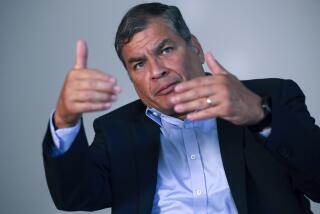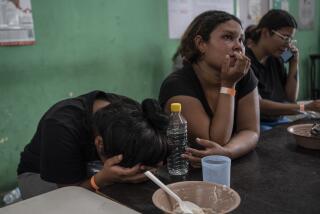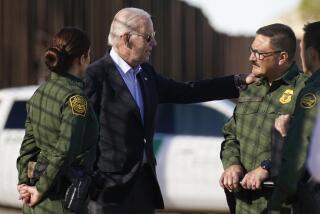U.S. Curbs Cuban Migration, Trade : Tightens Ban on Visas as Way to End Castro ‘Trafficking in Human Beings’
WASHINGTON — The Reagan Administration sought to cut off the last remaining route of Cuban immigration Friday to prevent President Fidel Castro’s government from easing its economic and social problems by encouraging its citizens to move to the United States.
The immigration curbs were included in a package of measures intended to tighten the U.S. economic embargo of Cuba by making it more difficult for Havana to evade the impact of the sanctions by indirect trade through third countries.
State Department spokesman Charles Redman, who announced the steps to end this “trafficking in human beings,” said that U.S. consulates around the world would refuse to grant immigrant visas to Cubans, closing a loophole in a year-old ban on the issuance of such visas to Cubans at the U.S. mission in Havana.
Kin, Prisoners Excepted
A senior Administration official said the measure effectively ends immigration from Cuba except for a specific list of fewer than 100 long-term political prisoners and members of the immediate families--spouses, minor children and parents--of U.S. residents. The purpose, he said, is to “deny Castro the benefits of normal migration.”
The restrictions apply to all Cubans, including those claiming to be political refugees. However, under longstanding U.S. policy, all requests for political asylum are decided on a case-by-case basis. The United States might find it difficult to deport illegal immigrants from Cuba because the Cuban government will not accept deportees from the United States.
Redman said the Castro government has been charging “extortionate” fees--ranging up to $30,000--to permit Cubans to travel to countries where they could seek admission to the United States.
The senior official, one of three who briefed reporters on the understanding that they would not be identified by name, said: “It is a small, poor country with 10 million people in it. This population is not all fully employed. Out-migration is a social outlet. . . . It is a saving to Cuba to allow some migration.”
‘Front Companies’
In addition to the visa curbs, the Administration sought to prevent Cuba from using “front companies” to trade with U.S. firms, to tighten restrictions on travel to Cuba by U.S. citizens and to reduce from $2,000 to $1,200 a year the ceiling on gifts that U.S. residents can send to friends or relatives in Cuba.
Redman said the limit on gifts was imposed because “the Castro regime controls all convertible currency sent to Cuba and provides Cuban recipients only a small share of the value of the money or goods sent.”
Administration officials said the complete package would deny the Castro government “millions of dollars in foreign exchange” each year. The officials said they were unable to predict the impact more precisely than that.
“The objective is to tighten enforcement of the embargo, denying to the Castro regime economic benefits from the United States while Castro continues to ignore international obligations and to pursue policies inimical to U.S. interests,” Redman said.
The senior officials said Cuba uses a network of individuals and front companies to import goods from the United States ranging from computers and advanced technology items to food, television sets and VCRs. In addition, they said, Havana uses such firms to sell fish and other products to the United States after first mislabeling them to indicate that they came from Central America or other Caribbean islands.
The Treasury Department already has a list of 118 firms and individuals--more than half of them operating out of Panama--that have been identified as agents of Havana. It is already illegal for Americans and U.S. companies to do business with firms and people on the list.
However, the officials conceded that no one had ever been prosecuted for trading with listed companies. One official said that most U.S. businessmen are unaware of the list.
The officials said that the new program calls for the Treasury to increase substantially its efforts to call attention to the list and to redouble its efforts to identify additional individuals and companies doing business with Cuba.
U.S. Specifies Terms
The officials said the trade regulations would remain in effect indefinitely, but the immigration restrictions would be lifted if Cuba agrees to reinstate the “Mariel agreement,” which Havana canceled in May, 1985, to protest Radio Marti, a U.S. government Spanish-language broadcast aimed at Cuba.
Under the terms of the Mariel pact, the United States agreed to issue “preference immigrant visas” to Cubans seeking to come to the United States, and Cuba agreed to take back criminals and mental defectives who had come to the United States with other immigrants in the 1980 “boat lift” of Cubans from the port of Mariel.
A month after Cuba terminated the agreement, the United States stopped issuing visas at the U.S. Interests Section, the American diplomatic mission in Havana, but continued issuing them at consulates in third countries until the issuance of Friday’s order.
The purpose of the ban on immigration, an Administration official said, is to prevent Cuba from enjoying the benefits of the Mariel agreement without meeting its obligations under the pact.
“A restoration of that agreement would bring about a restoration of normal migration,” the official said. “Castro has it in his power to restore normal migration relations.”
More to Read
Sign up for Essential California
The most important California stories and recommendations in your inbox every morning.
You may occasionally receive promotional content from the Los Angeles Times.










